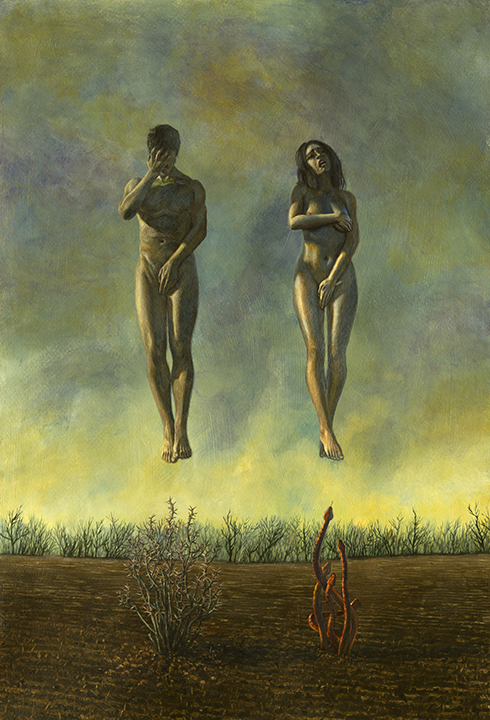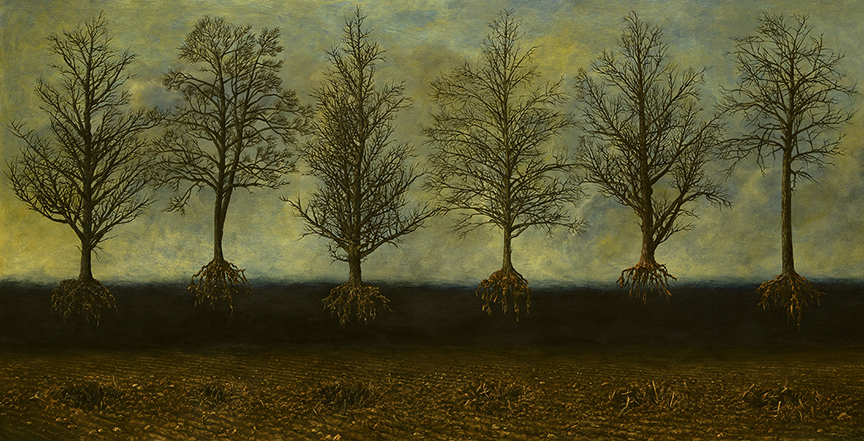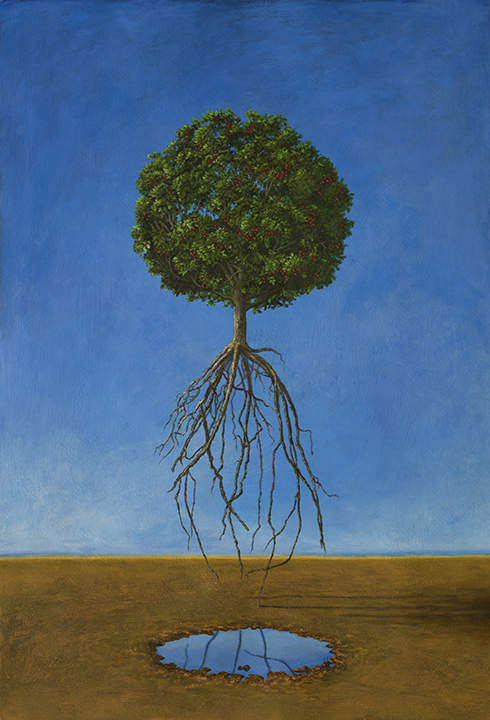March 6: The Root of Repentance
♫ Music:
Day 10 - Friday, March 6
Rung #5: ON TRUE REPENTANCE
Scriptures: 2 Corinthians 7: 8-10; 2 Chronicles 7:14
For though I caused you sorrow by my letter, I do not regret it; though I did regret it—for I see that that letter caused you sorrow, though only for a while—I now rejoice, not that you were made sorrowful, but that you were made sorrowful to the point of repentance; for you were made sorrowful according to the will of God, so that you might not suffer loss in anything through us. For the sorrow that is according to the will of God produces a repentance without regret, leading to salvation, but the sorrow of the world produces death. If My people who are called by My name humble themselves and pray and seek My face and turn from their wicked ways, then I will hear from heaven, will forgive their sin and will heal their land.
Poetry:
The Second O of Sorrow
by Sean Thomas Dougherty
Somehow, I am still here, long after
transistor radios, the eight-tracks my father blared
driving from town to town across Ohio
selling things, the music where we danced
just to keep alive. I now understand I was not
supposed to leave so soon, half a century
a kind of boulder that I’ve pushed up the hill
& now for a moment, like Sisyphus
I watch it roll.
I walk through the snow.
I breathe the dirty East Side wind
pushing past the Russian church, the scent
of fish & freighters & the refinery
filling the hole in my chest—how many years
have piled since I last stumbled out onto the ice
& sat down to die.
Only to look up at the geometry
of sky—& stood
to face whoever might need me—
THE ROOT OF REPENTANCE
Sorrow, at first glance, is but a breath away from death.
It can ravage the soul and body, creating destruction that seems to promise a wake of unchangeable, barren desolation. It is being swallowed by thick, swirling clouds of fog, being heard within the mournful timbre of the cello, being uprooted from a place that felt like home. It is coming undone. And it is this very thread, spun of tears and confusion, that God requires for binding severed relationships. Why?
Because sorrow evidences love.
Only someone who has been arrested by love can be gutted by grief. The ache of loss and the weight of having wronged are the most intolerable to the person whole-heartedly given to another. Sorrow felt deeply communicates, undeniably, “I care.”
And thus, in the wake of sin, God searches the hearts of his people for pain.
He dismisses lip service and shoulders past rituals dressed in religious finery. He sidesteps defensiveness and strips away pretense. But when, having arrived in our place of hiding, he finds a seed of sorrow, he grows tender. “The sacrifices of God are a broken spirit; a broken and contrite heart, O God, you will not despise.”
If you are like me, perhaps the grace of this good is not immediately obvious. Perhaps you are apt to skip right to forming an action plan for doing better next time. Perhaps you find it excruciating to discover yourself exposed before the One who dwells in unapproachable light. Perhaps you must fight not to avert your gaze from the reality of your own heart.
But it is precisely here that we are invited to linger. Amidst the agony of rediscovering the depth of our depravity and the desperate sickness within. In the face of our fallenness and knowledge of our weakness. Grieved by the understanding that our unfaithfulness offends the heart of God. Here, wait.
Practice the discipline of lament.
Lament. Though the rich Old Testament word sounds oddly foreign to modern ears and the very literal imagery of sackcloth, torn clothing, and dust may appear strange, lament seems a fitting garment for those becoming like the Man of Sorrows. And with the dawn of the Gospel, lament in the face of sin remains the most intimate place from which God invites us to draw near.
Those freed from self-deceit and anguished by the state of their souls know best the joy and security found in the words: “Nothing can separate you from my love.” Those most familiar with their need for forgiveness know best the potency of grace. Those who mourn know the deepest comfort; those who hunger and thirst for righteousness taste the most abundant satisfaction. And as Paul knows, those whose hearts break see transformation.
For from seeds of sorrow, God cultivates repentance.
From the jaws of death comes forth growth — and new life.
Prayer:
Have mercy on me, O God, according to your steadfast love; according to your abundant mercy blot out my transgressions. Wash me thoroughly from my iniquity, and cleanse me from my sin! For I know my transgressions, and my sin is ever before me. Against you, you only, have I sinned and done what is evil in your sight, so that you may be justified in your words and blameless in your judgment… Purge me with hyssop, and I shall be clean; wash me, and I shall be whiter than snow. Let me hear joy and gladness; let the bones you have broken rejoice… For you would not delight in sacrifice, or I would give it; you will not be pleased with a burnt offering. The sacrifices of God are a broken spirit; a broken and contrite heart, O God, you will not despise.
Amen.
-Ps. 51
Hannah Williamson
Admissions Marketing Copywriter
University Marketing
Biola University
For more information about the artwork, music, poetry, and devotional writer selected for this day, we have provided resources under the “About” tab located next to the “Devotional” tab.
To learn more about the themes of this year’s Lent Project, please go to:
https://ccca.biola.edu/lent/2020/#day-feb-25
About the Art:
Incident on Gaston Pike Series
(triptych with 3 detail images)
Jonathan Bouw
2018
Curses (After Masaccio)
17" x 25"
Acrylic on paper
Stitches
50" x 25"
Acrylic on paper
Tree of Life
17" x 25"
Acrylic on paper
The title Incident on Gaston Pike refers to the artist’s realization that the flat East Central Indiana landscape he traversed on his daily commute to work had taken on a spiritual dimension, providing fresh insight into “The Story,” as the artist puts it. The works invite the viewer to move in closer through their small scale, achieving a distinct intimacy as one examines the subtle detailing and fine brushwork. These three paintings belong to a series of five works that tell an “apocalyptic tale.” The three works included here are flanked by two works representing the earth crying out to Heaven in its groaning, as scripture puts it, and Heaven’s response to bring its suffering to an end. Curses (After Masaccio) pays homage to Masaccio’s Expulsion of Adam and Eve in the Brancacci Chapel in Florence. Adam and Eve are depicted uprooted, floating somewhere between heaven and earth, covering their shame as the branches of a thornbush and snakes stretch ominously upward to reach them. Stitches reflects the way our roots are weak in desolate seasons of life, like bare trees in Winter that can easily be uprooted by wind and rain. The last painting depicts a Rambutan tree, from the artist’s childhood growing up in the Philippines, as the Tree of Life descending to earth heavily laden with bright red fruit against a clear blue sky, to transform the wilderness as promised in scripture.
About the Artist:
Jonathan Bouw is the Department Co-Chair of the Art, Film & Media Department and a Professor of Art at Taylor University. He was born and raised in Southeast Asia. He completed college and art school in the US and received his graduate degree from The School of Visual Arts in New York. He has been actively producing editorial and narrative artwork alongside a career as a university art professor. Jonathan is a Fulbright Scholar and has received some of the following awards: The Paula Rhodes Award, The Society of Illustrators - Stefan Dohanos - Best of Show Award, and The Gelett Burgess Award for outstanding contribution to children’s literature. He is a member of the Society of Illustrators in New York and has worked for clients such as Book of the Month Club, Oxford Press, The Chronicle of Higher Education, Education Week, Improbable Philanthropy, and Harvard Graduate School of Education.
http://jonathanbouw.com/
About the Music:
“Sorrow” from the album Atlas: II
The Lyrics:
It feels like falling.
It feels like rain.
Like losing my balance
Again and again.
It once was so easy;
Breathe in, breathe out.
But at the foot of this mountain,
I only see clouds.
I feel out of focus,
Or at least indisposed
As this strange weather pattern
Inside me takes hold.
Each brave step forward,
I take three steps behind.
It's mind over matter -
Matter over mind.
Slowly, then all at once.
A single loose thread
And it all comes undone.
Where there is light,
A shadow appears.
The cause and effect
When life interferes.
The same rule applies
To goodness and grief;
For in our great sorrow
We learn what joy means.
I don't want to fight, I don't want to fight it.
I don't want to fight, I don't want to fight it.
I don't want to fight, I don't want to fight it.
But I will learn to fight, I will learn to fight,
'Til this pendulum finds equilibrium.
Slowly, then all at once.
The dark clouds depart,
And the damage is done.
So pardon the dust
While this all settles in.
With a broken heart,
Transformation begins.
Composer/Performer/Lyricist:
Ryan O'Neal (b. 1983) is a Chicago-based singer-songwriter, producer and composer who makes music under the name of Sleeping at Last. His music can be heard frequently on popular TV shows and films such as The Twilight Saga, Grey’s Anatomy, American Idol, The Fault in Our Stars, So You Think You Can Dance, The Ellen Degeneres Show and many more. He has also scored feature documentary films for SoulPancake, Charity: Water and the Global Citizen Festival in NYC. In 2013, Ryan began the long-form concept project, Atlas, which is an ongoing series of new music to be released over the course of many years. In 2016, Ryan began The Sleeping At Last Podcast and his Atlas: Year Two release features 25 new songs that explore the themes of human development; sense, emotions and a song for each of the nine unique Enneagram types.
http://www.sleepingatlast.com/about
About the Poet:
Sean Thomas Dougherty (b. 1965) is an American poet and author of 13 books. Publisher’s Weekly describes Dougherty as “A blue-collar, Rust Belt romantic to his generous, enthusiastic core,” and poet Dorianne Laux praises him as “the gypsy punk heart of American poetry.” His awards include a Fulbright Lectureship to the Balkans, two PA Arts Council Fellowships in Poetry, and inclusion in Best American Poetry 2014. His latest book The Second O of Sorrow, was released in 2018. Known for his dynamic public readings, Dougherty has performed at hundreds of venues, including readings in Albania and Macedonia where he appeared on national television, sponsored by the US State Department. He lives in Erie, Pennsylvania, where he works as a medical technician.
http://seanthomasdoughertyp.fatcow.com/?page_id=40
About the Devotion Writer:
Hannah Williamson
Admissions Marketing Copywriter
University Marketing
Biola University
Hannah Williamson is an alumna of Biola University and the Torrey Honors Institute (2018). She is currently employed as Biola's Admissions Marketing Copywriter and cares deeply about using language to connect, reconcile, and influence people.



